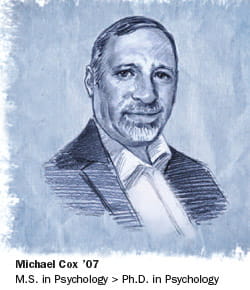Doctors said he'd never work again, but Michael Cox is beating mental illness through education—and helping others.
Michael Cox could teach Tony Robbins a thing or two about personal achievement. Diagnosed with bipolar disorder 10 years ago, the 56-year-old is at first glance, blithe. Armed with a warm smile, southern drawl, and contagious sense of humor, Cox is empathetic, candid, and the first person mental health patients see when they walk through Westbrook Health Services' doors in Parkersburg, West Virginia, where he works as an intake clinician.

He was working as a chemical operator at a Union Carbide plant in Sistersville, West Virginia, a city dubbed Chemical Valley by the locals. A Vietnam War veteran with a wife and three children, Cox was grateful for the job. Plant operator positions, albeit unglamorous, were hard to come by. Battling back depression, frustration, fear, and anxiety, he stayed the course for 14 years—until one day when his spirit broke and repressed emotions triggered a manic episode like none he'd ever experienced before.
Tears chafed my face, says Cox. It felt as if a heavy chain was wrapped around my chest, squeezing the life from me.
Buckling under the weight of his illness, Cox went on disability, retired from his job, and spent four years in and out of psychiatrists' offices. He was prescribed antidepressants that made him listless and unable to communicate. Doctors told him he'd never recover.
Basically they said I was a vegetable, says Cox. I had no desire for human contact whatsoever, and I was on such a high dose of medication that I couldn't carry on a conversation.
Determined to overcome his diagnosis, he began pouring over books about bipolar disorder and eventually enrolled at West Virginia University.
I was so unsure of myself, says Cox. I was the oldest student in class—older than my professors even. I remember thinking, 'What am I doing here? Maybe the doctors are right. Maybe I can't do this.'
Stirred by his desire to help other psychology students, Cox pioneered an internship program at Westbrook and also wrote a book, Behind the Smiles, which he distributed for free to friends and family.
In 2003, he received a regents bachelor of arts degree with an emphasis psychology from West Virginia University and was hired as a full-time clinician at Westbrook, where he helped launch a community outreach program aimed at placing Parkersburg's mentally ill homeless population in supervised homes with access to clinical resources.
I did whatever I could do to shed the stigma, says Cox. I'd talk to people in assisted-living homes and say, 'Hey, I once sat where you are. You can lead normal life.'
After researching ways to become a licensed psychologist, Cox enrolled Walden's M.S. in Psychology program, thrilled to be able to work and go to school without having to leave his hometown.
In 2007, he earned his MS in Psychology and began working as an adjunct psychology professor at West Virginia University. He's encouraged so many of his students to pursue higher degrees at Walden that Enrollment Specialists nicknamed him their unofficial West Virginia spokesman.
Cox is now pursuing a PhD in Psychology at Walden on the track for education and research. He says he's found ways to extend the euthymia, or neutral stage, in patients suffering from mood disorders, and he's applying for a grant to research adherence to treatments for bipolar disorder.
Walden has made me feel more fulfilled as an instructor, says Cox. I had doctors tell me I'd never work again, and now I'm out in the community making changes, going for my PhD, telling students that they can do it too if they just put their shoulder to the wheel and push. —Heidi Kurpiela
Michael Cox has referred 14 people to Walden University. Here's how and why he does it.
Degree Earned: MS in Psychology from Walden University, 2007
Currently Pursuing: PhD in Psychology with a specialization in education and research
Anticipated Graduation Year: 2010
Current Job: Psychology professor at West Virginia University at Parkersburg
How did you learn about Walden? I ran across an advertisement while searching for distance learning on the Internet. After I got my bachelor's degree, I said I wanted to be a doctor, so I set out to find a way to do it.
How many people have you referred to Walden? Fourteen—half have attended.
Why do you refer people to Walden? In our area of West Virginia, things are pretty depressed. A lot of my students are young folks who are married with children or raising kids on their own. Walden fits in well with their schedules, and if you compare it to the prices of other schools, it is actually cheaper. There's no room and board, no commute, and Walden's reputation is solid.
Who do you refer? I look at peoples' life situations. I look at their grade point averages. If they're go-getters with a vision and ambition, I consider them good candidates. They've got to be serious about their education and self-disciplined enough to stay the course.
How do you refer? I find out what their needs are. I tell them what Walden can do for them. I don't get into the nuts and bolts of the system. Instead, I tell them how Walden can meet their long-term needs—big picture stuff. I don't try to shove it down their throats.
How do people react? In truth, most people aren't aware of the opportunities out there. They're familiar with brick-and-mortar institutions, but they don't entirely understand online education.
What objections do people have? They will tell me they're not disciplined enough, or that they can't afford it.
How do you counter those objections? I tell them I'm from the same place they're from, that I overcame the same obstacles. I tell them, there was hope for their professor, and there's hope for them.
How does referring people make you feel? More fulfilled as an instructor—like I'm paying it forward.



